




 |
   |
 |
|
La Batteria Batti Mamzelle Battles Bauer |
Peter Baumann Baxter Lullaby Baxter Beach Boys |
Beachwood Sparks The Beatifics Beauregard, Violletti, Ste-Claire |
Beautiful People Beck Beck, Bogert & Appice |
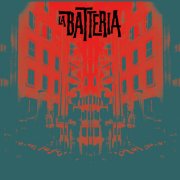 |
La Batteria (2015, 46.13) ****/TT |
|
| Chimera Vigilante Scenario Formula Vice Versa Manifesto Dilemma Espresso |
Incognito Scenario 2 Zero Persona Non Grata |
|
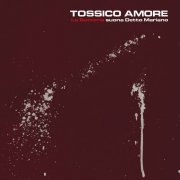 |
Tossico Amore (2016, 21.07) ****/½M1M29 M2 M3 M11 M21 M17 M35 |
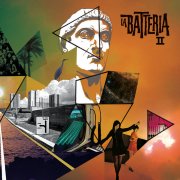 |
La Batteria II (2019, 68.05) ***½/½ |
|
| Prologo Largo Fuga Monica Vitti Dogma Moviola Antenna Stiletto Intermezzo |
Diva Affresco Spirale Furfante Amedeo Intervallo Romanzo Megalopoli Eldorado 2170 Ultima Speranza |
|
Current availability:
Mellotrons used:
La Batteria (named for the Lucio Battisti album? It simply means 'drums') are a new Italian Giallo-style outfit, playing a form of instrumental progressive rock heavily influenced by '70s film soundtracks, played on period equipment. Sounds familiar? Goblin, Zombi, Zoltan, anyone else on Austria's Cineploit label... There's always room for another band in this style, though. 2015's La Batteria is stuffed with great material, possibly at its best on opener Chimera, the funky, synth-driven Formula, Incognito, which channels Theme From Shaft, before shifting into Gallic noir and the ripping Zero. The band's website states, "All the instruments recorded are exclusively vintage", including Stefano Vicarelli's Mellotron, with strings on opener Chimera and Manifesto, strings and choir on Dilemma and choirs on closer Persona Non Grata. I wouldn't call it one of the album's central features, but always nice to hear.
The following year's Tossico Amore mini-album keeps it short, although I'm not privy to the reasoning behind titling every track 'M(number)'. Highlights? M2, M17 and brief, gentle closer M35, maybe. Very little of Vicarelli's Mellotron this time, with naught but background cellos on M21, the album's strings probably emanating from a Solina. 2016's La Batteria II tells us that they didn't consider the mini-album to be a proper release, although, if combined with this rather overlong effort, it would make two sensibly-lengthed albums. Had the band trimmed this down to, say, the length of their debut, they would've had another killer album. As it is, despite material of the quality of opener Prologo, the stomping Dogma, the brief Intermezzo and Spirale, the overall effect is of slightly over-egging the pudding. Once again, next to no Mellotron, with naught but occasional choir chords on Prologo and a background string line on Largo. All rather splendid, then; available on Bandcamp, if you're not in the mood for hard copies.
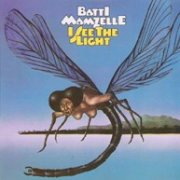 |
I See the Light (1974) ***½/T½ |
|
| Lament San Juan Caroni Seasoning Voodoo Man Get Out of My Way Love is Blind Bird |
I See the Light Streaking |
|
Current availability:
Mellotron used:
Batti Mamzelle (French patois for 'crazy lady', the Trinidadian term for a dragonfly) found themselves attached to the London 'afro-rock' scene in the early '70s, alongside the better-known Osibisa, despite not actually featuring any African musicians per se. They mixed steel drums and other percussion into a kind of Latin/funk/rock brew, making music that must have been devastating live. Their sole album, I See the Light, apparently took a while to record, as the band (unsurprisingly) had trouble capturing their live sound on tape and, while the end result gives some idea of how they must've sounded, the limitations of the studio presumably hindered the band's chances commercially. Voodoo Man is a prime example of their, er, voodoo, with an outrageously propulsive rhythm, while Bird sounds like a Caribbean Santana, although Winston Delandro's guitar work lack's Carlos' fire.
Osibisa's ex-keyboard player, Robert Bailey, produced (his brother was the drummer and their dad was manager), adding Mellotron to a few tracks. The background string part on Seasoning is neither here nor there, but an upfront flute part on Get Out Of My Way enhances the track nicely, although that would seem to be your lot. I had the impression this was pretty hard to find, but I found a slightly battered copy in a suburban London shop for two quid, although that was probably more down to luck than judgement. Its almost unique mix of steel pans and more standard instrumentation is worth hearing, most of the solos taken on percussion rather than guitar or keys, the notable exception being the ripping fuzz guitar solo on album closer Streaking. Not that much Mellotron, but an interesting curio that still stands up well today.
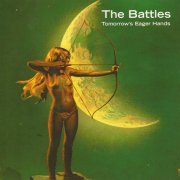 |
Tomorrow's Eager Hands (2005, 39.13) **½/T½ |
|
| Changes Omega Man Poem #8 (That Would Be Good) Wonder... Suzanne Susan's Reply (Make Love) in the Beds of Rivers We Were Right to Fight |
In Exelsis, Yeah Northern Man Right on |
|
Current availability:
Mellotron used:
Vancouver's The Battles (nothing to do with US experimentalists Battles, actually formed later), only seemingly released two albums, 2005's Tomorrow's Eager Hands being the second and last. Chiefly psych/indie-by-numbers with a new wave bent, probably at its dullest on the overlong, repetitive Northern Man, its better tracks are the ones where the band head off-piste, notably Susan's Reply, a strange little experimental thing, all echoed synths and tinkly percussion and (Make Love) In The Beds Of Rivers, which could almost be an early Black Mountain track.
Speaking of which... Black Mountain's Jeremy Schmidt plays (presumably) his own Mellotron, mostly clustered towards the beginning of the album, with flute and string parts on Omega Man, background strings on Poem #8 (That Would Be Good), more upfront flutes and background choirs on Wonder... and a brief burst of flutes on closer Right On. Enough to make this worth hearing? No.
See: Black Mountain
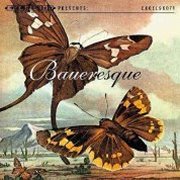 |
Baueresque (2004, 45.59) ***½/TTT |
|
| Bouillabaisse of Brilliance Libitz in a Car A Renegade Cop Cubicle The Record Machine Thin White Line It's Getting Better Life's a Breeze |
Open Air A Bird Called Fish Swag Climbing Trees Doctor in Love Everything After All |
|
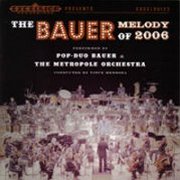 |
The Bauer Melody of 2006 (2006, 44.58) ***/T |
|
| Bouillabaisse of Brilliance Sunburned Teeth It's Getting Better Boring Pictures At the Door Long Way Away Blissfully Up Save |
Here Come the Germans Herrmann I'm No Prototype! Captured in a Spinning Wheel Don't Think About it Too Much Snow in Spring |
|
Current availability:
Mellotrons used:
It seems Bauer are, essentially, the duo of Berend Dubbe (ex-Bettie Serveert) and Sonja van Hamel, who between them play everything on their third album, Baueresque. They use a whole raft of vintage gear, including a MiniMoog, an ARP Odyssey, Rhodes, Wurly and Hohner pianos and a new Mellotron MkVI (does that mean it's no longer 'vintage'?). Musically, they describe themselves amusingly as 'queasy listening' or 'soft psych synth pop', both of which should give you some idea of their sound. The songwriting's really rather good, although I suspect this is going to take a few plays to really sink in; highlights are difficult to pick out on a first listen. Actually, d'you know what this reminds me of? Mattias 'Änglagård' Olsson's work with several of his recent projects such as Reminder or Nanook of the North, so if you're into them, you can't go too far wrong here. I'm having trouble identifying the string sounds on opener Bouillabaisse Of Brilliance: M300B solo violin? A new sound? Cellos underneath, I think, but it's hard to tell. No such issues on Thin White Line; standard M400 strings throughout and a front-of-the-mix flute melody on Open Air. I think that's Mellotron choir on Swag, along with more strings, flutes and cellos again on Climbing Trees and more of the same (the band must own at least two tape frames) on the other highlighted tracks.
The duo's follow-up, The Bauer Melody of 2006, is a bit of an oddity, being a live album recorded with a small orchestra alongside their usual vintage kit, credited to 'Pop-Duo Bauer & the Metropole Orchestra'. The strings and brass have the effect of making an already cheesy thing, er, cheesier, bringing in something of a Scott Walker/John Barry vibe to the proceedings, but I'm sure the end result is exactly the sound the band were looking for. Dubbe plays flute chords on Sunburned Teeth and a monophonic part on Don't Think About It Too Much and, while there may be other parts hidden under or playing along with the real strings and/or flutes, it's almost impossible to tell. If you don't object to retro/modern crossover pop, you may well go for Baueresque; I've seen it memorably described as 'pop made by a prog band', which isn't to say that it isn't pop - just clever pop.
See: Bettie Serveert
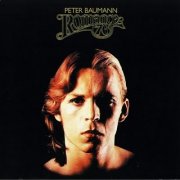 |
Romance 76 (1976, 32.50) ***½/TTTBicentennial PresentRomance Phase By Phase Meadow of Infinity (Part 1) The Glass Bridge Meadow of Infinity (Part 2) |
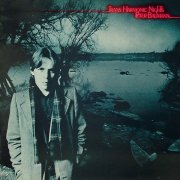 |
Trans Harmonic Nights (1979, 37.45) ***½/½This DayWhite Bench and Black Beach Chasing the Dream Biking Up the Strand Phaseday Meridian Moorland The Third Site Dance at Dawn |
Current availability:
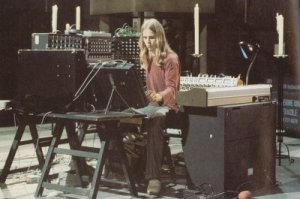 |
Mellotrons used:
Peter Baumann was still a member of Tangerine Dream when he recorded Romance 76, his first solo album, the title obviously refering to several things, including its year of release and the 'aged' half of Baumann's face on the sleeve. Unsurprisingly, it delves deeply into Tangs territory, albeit without Edgar Froese's guitar interjections; six lengthy instrumental synth-led pieces with a reasonable dash of Mellotron here and there. Apart from the usual sounds, I suspect we're hearing Mellotron piano and tuned percussion, though it's always difficult to prove with the 'lesser-known' sounds.
His three-years-on follow-up, Trans Harmonic Nights, is possibly slightly more 'mainstream' (relatively speaking, of course), highlights including White Bench And Black Beach and The Third Site, coincidentally. Downsides? Overuse of vocoder; a little goes a long way, Pete. Minor Mellotron use (thanks, Tony), with a few seconds of heavily-phased strings on White Bench And Black Beach and a polyphonic flute intro on The Third Site, although the voices on Dance At Dawn are samples; quite possibly Fairlight, given the recording date.
See: Tangerine Dream
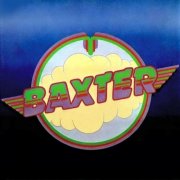 |
Baxter (1973, 44.46) ***½/TTTBy the GatesGive it All Renaissance Woman '51 Gentle Arms Moonfire II Can?t Find The Time Doctor Doctor 197Three |
Current availability:
Mellotron used:
Baxter were one of those early-'70s US bands who can only really be described as 'rock': not heavy enough to be 'heavy', prog enough to be 'prog' or soft enough to be 'West Coast'. Their sole, eponymous album from '73 displays a mixture of styles, from the twin-guitar hard rock of '51 through the near-country balladry of Gentle Arms to the almost-prog of Renaissance Woman and Moonfire II, the two main tracks that save this album from mediocrity and gain it an extra half star. There are other progressive moments, not least in Doctor Doctor and 197Three, but too much of this album is mid-paced third-division material, which explains why you've probably never heard of them before.
Mellotron from both Doug Arioli and Steve Kirshenbaum, though I've no idea who played what and where. Renaissance Woman marks the first entrance of the Mellotron, with a cello part that couldn't be anything else, with a more 'normal' string part on Gentle Arms, leaving the album's major Mellotron interjection to side two's Moonfire II, with some very upfront strings and less of the same on closer 197Three. So; Baxter is a game of two halves, the band's proggier material being dragged down by their more straightforward stuff. However, I'm quite sure that the latter went down better on stage and, since I'm sure they relied on live work to pay the bills, who can blame them for recording some of it? Anyway, not bad, not great, with a surprising amount of Mellotron work.
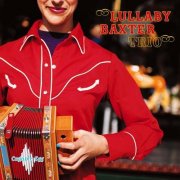 |
Capable Egg [as Lullaby Baxter Trio] (2000, 38.13) ***½/T |
|
| Hopscotch The Anyway Song Knucklehead Rooster in Love Mr. Powder Blue Breadbox The Chatterbox Chronicles Mama (Should I Bake a Cherry Pie and Hide You Inside?) Ding-a-Ling |
Morty-Mort-Morton Showstopper Calhoun Spacegirl Horsey Don't Snore Lullaby Ding-a-Ling (reprise) |
|
Current availability:
Chamberlin used:
Angelina "Lullaby Baxter" Iapaolo's first album (as the Lullaby Baxter Trio), 2000's Capable Egg, is a largely acoustic jazzy pop effort, incorporating a plethora of other genres, actually rather better than that sounds, helped somewhat by the presence of some of the rather good Oranj Symphonette as her backing band. Ms Baxter's voice is the kind often referred to as 'sultry', while her lyrics are, frankly, quite bonkers, albeit in a good way, more nuts examples including the superbly-titled banjo-fest Mama (Should I Bake A Cherry Pie And Hide You Inside?), Ding-A-Ling and Horsey Don't Snore, while musical highlights include upbeat opener Hopscotch and the harmonium-fuelled Mr. Powder Blue Breadbox.
Rob Burger plays Chamberlin, with occasional strings on opener Hopscotch and string and wobbly flute parts on Horsey Don't Snore; good to hear, but not enough on its own to warrant purchase. However, anyone looking for a new take on the tired old singer-songwriter schtick might just have come to the right place. Impressive. Incidentally, the album timing above eliminates around seven minutes of dead space in between Lullaby and Ding-A-Ling (Reprise).
See: Samples etc. | Oranj Symphonette
Be-Bop Deluxe (UK) see: |
 |
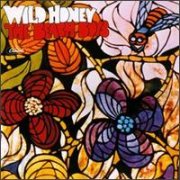 |
Wild Honey (1968, 24.22) ***½/T |
|
| Wild Honey Aren't You Glad I Was Made to Love Her Country Air A Thing or Two Darlin' I'd Love Just Once to See You Here Comes the Night |
Let the Wind Blow Now She Boogalooed it Mama Says |
|
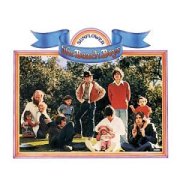 |
Sunflower (1970, 36.49) ***½/½ |
|
| Slip on Through This Whole World Add Some Music to Your Day Got to Know the Woman Deirdre It's about Time Tears in the Morning All I Wanna Do |
Forever Our Sweet Love At My Window Cool, Cool Water |
|
Current availability:
Chamberlins used:
By 1968, The Beach Boys were beginning to lose their way. After the Smile debacle and the uneasy compromise of Smiley Smile (****), Brian Wilson co-wrote most of Wild Honey with his arch-nemesis, Mike Love, with patchy results. It opens well enough with the title track, but most of the tracks fade awkwardly and sound slightly unfinished, with the obvious exception of the album's standout, Darlin'. It's also about the shortest album on this entire site, including one that runs at 45 rpm and at least one mini-album, indicating, I suspect, the band's serious loss of direction and confidence. Now, this has been ping-ponging its way between this page and my old Mistaken ID page for a while, but it seems to have found its way back here for good. Country Air has a little of what are presumably Chamberlin flutes, as the chances of any Mellotron finding its way to the West Coast in 1968 are slim-to-nonexistent. A nice part, but nothing outstanding.
Sunflower is generally regarded as the best Beach Boys album since the mid-'60s, although, to be honest, it sounds a bit lightweight to my ears after the wonders of Pet Sounds, or Brian's slightly belated Smile (only forty years late, Bri). The harmonies are certainly there, as are those gorgeous chordal twists (the 4th in the bass or whatever it is), but there's no God Only Knows, no Caroline No, no Surf's Up (finally unveiled to the listening public on the album of the same name the following year). I'm probably being a bit churlish, though, as there's plenty hear for the ear attuned to the Beach Boys' unique melodic sense, not all of it written by Brian; he has no compositional input on five of its twelve tracks, while Dennis writes or co-writes three. But what's it doing here, eh? Donny Lang tells me that Add Some Music To Your Day and Forever have faint Chamberlin string lines, probably played by Brian. They're there all right, hidden away beneath the vocals, but they're hardly the most auspicious use of the instrument ever, to the point where I wouldn't have known had I not been told.
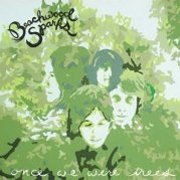 |
Once We Were Trees (2001, 51.25) ***½/T |
|
| Germination Confusion is Nothing New The Sun Surrounds Me You Take the Gold Hearts Mend Let it Run Old Manatee The Hustler |
Yer Selfish Ways By Your Side Close Your Eyes Banjo Press Conference Jugglers Revenge The Good Night Whistle Once We Were Trees |
|
Current availability:
Mellotron used:
Beachwood Sparks fit fairly and squarely into the 'alt.country' ghetto, though it seems to me there are far worse places to be. Along with Wilco, Son Volt et al., their efforts to build on the brief career of Gram Parsons, including his work with The Byrds, is not only admirable, but actually rather good, even to those of us who loathe mainstream country music with a passion; how thankful I am that I live in a country where that bilge isn't ubiquitous. They released their eponymous debut in 2000, following it a year later with Once We Were Trees.
Distinctly different from the other Americana I've heard, it's a good selection of songs, without being especially outstanding, although Let It Run's drifting-tumbleweed feel and Syd Barrett-ish guitar definitely catch the ear; possibly the work of a band still trying to find their collective feet. I wasn't at all sure there would be any Mellotron on here, but Close Your Eyes' choirs are pretty authentic, while the vibes on Banjo Press Conference (best song title award) have that Mellotronnish key-click about them. The flutes on By Your Side are slightly less convincing, but I'll leave it highlighted until/if I find out it isn't. The supposed Mellotron on the following year's mini-album Make the Cowboy Robots Cry turns out to be sampled, however.
See: Samples etc. | All Night Radio | The Quarter After | Fairechild
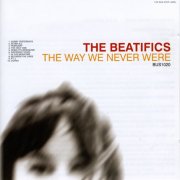 |
The Way We Never Were (2002, 33.12) ***½/TT½ |
|
| Sorry Yesterdays After All February The Only One When it's Whenever Different Stars In the Meantime Between the Lines |
Pt. 2 Outro |
|
Current availability:
Mellotron used:
I don't know if The Beatifics' name was chosen to file next to The Beatles, but I wouldn't be surprised; they fit fairly and squarely into the powerpop genre, clearly worshipping at the altar of all the 'B' bands, not to mention later proponents of jangly, melodic, intelligent pop. After their sample-using 1996 debut, How I Learned to Stop Worrying, they released their In the Meantime EP in 2001, crediting Mellotron; three of its five tracks appeared on the following year's The Way We Never Were, while there's no Mellotron on the other one I've heard. Said album appeared in 2002 and the band seem to have taken on a bit of a garage rock influence, notably on opener Sorry Yesterdays, although the album as a whole seems rowdier than their previous work. The material's decent enough, if possibly not quite meeting the band's earlier standards, seeming slightly more derivative (spot the cheeky chord at the end of In The Meantime...).
All musicians concerned are given a general credit, but, given that he's credited with Mellotron on In the Meantime, it seems likely it's vocalist/guitarist Chris Dorn who plays Third Ear recordings' MkVI, with strings on After All, flutes and phased strings on The Only One and flutes on When It's Whenever and Different Stars.
See: Samples etc.
The Beatles (UK) see: |
 |
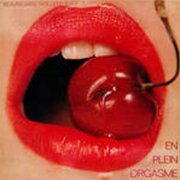 |
En Plein Orgasme (1975, 31.46) **½/TT |
|
| Frénésie L'Espion Défais Ta Blouse Orgasme Boule de Gomme Miss America Dis N'Importe Quoi Ce Soir (Je Sens Que Tout Peut M'Arriver) |
Superstar Faites Quelque Chose pour Moi |
|
Current availability:
Mellotron used:
For years, I've thought that (Pierre) Beauregard, (Denis) Violletti and (Adrienne) Ste-Claire had released a self-titled album, followed by 1975's En Plein Orgasme. Wrong. It seems their eponymous (and last) record follows their debut, a thoroughly ordinary, French-language pop/rock effort, at its (relative) best on Orgasme and its worst on its occasional forays into proto-disco, notably closer Faites Quelque Chose Pour Moi.
Serge Locat plays (presumably) Harmonium's Mellotron, in full 'too cheap to employ a string section' mode, with background strings on opener Frénésie, Défais Ta Blouse and Orgasme, cellos and strings on Miss America and a few string chords towards the end of Canadian hit Ce Soir (Je Sens Que Tout Peut M'Arriver). Much as I hate to say it, this is why the Musician's Union got so hot under the collar about tape-replay machines; they actually were sometimes used to do musicians out of a job.
See: Serge Locat
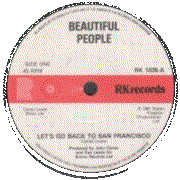 |
7" (1981, recorded 1969, 5.25) ***½/TT Let's Go Back to San Francisco, Pt. 1 Let's Go Back to San Francisco, Pt. 2 |
Current availability:
Mellotron used:
I've known about this pairing for years, but had no idea they were released in 1981, of all years. The Beautiful People were another name used by John Carter and Ken Lewis, the creators of the mostly fictitious Flower Pot Men, of Let's Go To San Francisco fame. Let's Go Back... was a 1969 recording, clearly designed to cash in on its two years-earlier predecessor, then left in the can for an inexplicable twelve years. No wonder it appeared on the little-known RK label... Both sides of the single are actually almost as good as the original two-part track, with the proviso that they lack even its dubious claims to originality.
Carter and/or Lewis provide the distant MkII Mellotron flutes on the 'A' and the major string part on the flip, making this a lesser-known Mellotron must-have from the era. Luckily, the tracks have been anthologised more than once, now easily available on RPM's 2007 Flower Pot Men release, Listen to the Flowers Grow.
See: The Flower Pot Men
 |
Odelay [Deluxe ed. Disc 1] (1996/2008, 70.31) ***½/0 (T) |
|
| Devil's Haircut Hotwax Lord Only Knows The New Pollution Derelict Novacane Jack-Ass Where it's at Minus |
Sissyneck Readymade High 5 (Rock the Catskills) Ramshackle Diskobox [Deluxe ed. adds: Deadweight Inferno Gold Chains] |
|
 |
Mutations (1998, 49.18) ***/T |
|
| Cold Brains Nobody's Fault But My Own Lazy Flies Cancelled Check We Live Again Tropicalia Dead Melodies Bottle of Blues |
O Maria Sing it Again Static Diamond Bollocks |
|
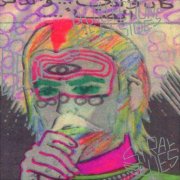 |
Stray Blues (2000, 29.02) ***/½Totally ConfusedHalo of Gold Burro Brother Lemonade Electric Music and the Summer People Clock Feather in Your Cap |
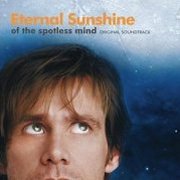 |
Eternal Sunshine of the Spotless Mind (2004, 5.54) ***½/T[Beck contributes]Everybody's Gotta Learn Sometimes |
Current availability:
Mellotrons/Chamberlin used:
After a shaky 'potential one-hit wonder' start (1994's Loser), Beck Hansen has gone on to become the darling of the 'alternative' scene and one of its most visible members. Although his early-'90s signing with Geffen was ostensibly because they allowed him to concurrently release less commercial material on indie labels (three in 1994 alone), he only seems to've made use of this facility initially, with two indie albums in '94, after his Geffen debut, Mellow Gold.
1996's Odelay was an unexpected success; I can only assume it caught the era's zeitgeist perfectly, which was rather crafty (or lucky) of Mr. Hansen. Listening to it now, its genre-mangling still sounds refreshing, although its mad sampedelica's a little dated sixteen years on. While there's no Mellotron on the original album, one bonus track on 2008's double-disc expanded edition, Deadweight, features a brief repeating flute part from yer man himself. '98's Mutations was his third major release and is a blend of low-fi(ish) folk-influenced material, just about everything thrown into the pot somewhere down the line, not least the slightly unwelcome country of Cancelled Check and Sing It Again. Roger Manning, once of the extraordinary Jellyfish, plays Mellotron on two tracks: a gorgeous flute part on Dead Melodies and some solo strings right at the end of Diamond Bollocks (not a word in general use in the States; is that why he's used it?).
One more definite Beck Mellotron track in his version of Skip Spence's Halo Of Gold, originally recorded for the Spence tribute album More Oar, finding its way onto Beck's b-sides compilation Stray Blues, apparently only available on Geffen Japan. It's a heavily psychedelic version of what's probably a heavy psychedelic track, with some form of electronic organ making flutey sounds in the verses, then actual Mellotron flutes during the choruses. The rest of the album's as you'd expect; Beck odds'n'sods that hardcore fans will want, while the rest of us shrug our shoulders. Incidentally, please can we hear no more of that Scientology bullshit please, Mr. Hansen? Just because with you grew up around that insidious crap is no excuse to get caught up in it yourself. You're far more intelligent than most 'celebrity Scientologists', after all...
See: Eternal Sunshine of the Spotless Mind | Scott Pilgrim vs. the World
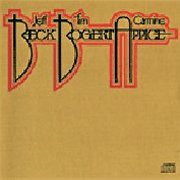 |
Beck, Bogert & Appice (1973, 37.10) ***/TBlack Cat MoanLady Oh to Love You Superstition Sweet Sweet Surrender Why Should I Care Lose Myself With You Livin' Alone I'm So Proud |
Current availability:
Mellotron used:
BBA were Jeff Beck's then-latest attempt to find a band scenario that suited him (he never did, of course), with the defunct Vanilla Fudge's rhythm section, Tim Bogert and the superb Carmine Appice. Musically, Beck, Bogert & Appice's a bit of a funky hard rock mish-mash; not heavy enough to really grab the Zeppelin/Purple fans, but too 'rock' for the mainstream. Typical Beck, really; rarely in quite the right place at quite the right time. Saying that, it has its moments, Lose Myself With You rocks and funks with equal enthusiasm, while opener Black Cat Moan gets things off to a good start, but, thirty years on, much of the album just sounds far too stodgy and lifeless compared to many of their contemporaries, whose work still stands up well today.
There's only one Mellotron track, credited: Oh To Love You, Mellotron played by Duane Hitchings; an undistinguished ballad, with Mellotron strings (and possibly cellos) coming in about a minute from the end. Beck, Bogert & Appice is, well, OK I suppose, but I'm having difficulty getting excited about much of it, although some of Beck's guitar work is as good as you'd expect. Pick it up if you see it cheap, but don't bother for the Mellotron.
See: Carmine Appice